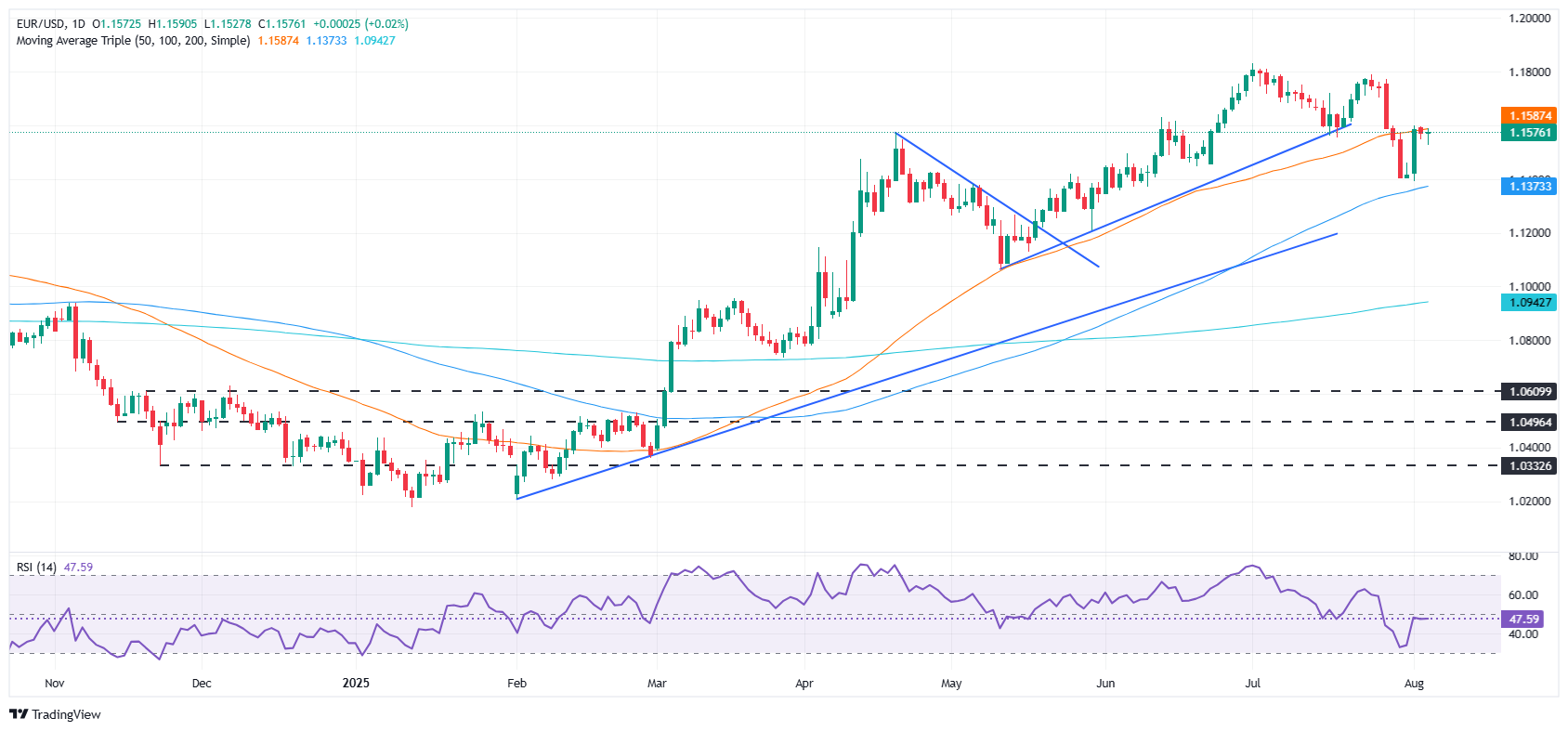Created
: 2025.08.06














![]() 2025.08.06 08:10
2025.08.06 08:10
The EUR/USD holds firm during the North American session on Tuesday, with traders still digesting the latest employment figures in the United States (US) and the release of further US data. Across the pond, HCOB Flash PMI numbers were mixed across the European Union (EU) yet failed to push the Euro higher against the US Dollar. At the time of writing, the pair trades at 1.1573, unchanged.
Further developments, during the session, revealed that US President Donald Trump was considering nominating the US Treasury Secretary Scott Bessent to the vacant spot on the Federal Reserve, following Adriana Kugler's resignation as Fed Governor, effective on August 8. Nevertheless, Bessent asked not to be considered for the position.
On the data front, the Institute for Supply Management (ISM) revealed that business activity in the services sector is stagnating. Earlier, the US Commerce Department announced that the trade deficit shrank to an almost 2-year low in June, while China's trade gap narrowed.
Following the data release, the EUR/USD remained within familiar levels, as the prints hovered around economists' estimates, with the PMI dipping, though expanding.
In the EU, the HCOB Services PMI for the whole bloc showed some signs of softening, down from 51.2 as expected in July, to 51. Figures in France and Italy followed suit, with the former dropping to 48.5 from 49.7 in the previous month, and estimates, with the latter rising from 52.1 to 52.3, but below estimates.
The outliers were Spain and Germany, as both countries showed an improvement in the services sector, yet the prints maintained the status quo, as seen by the EUR/USD's reaction.
The US economic docket will feature Fed speakers, with traders awaiting Boston Fed Susan Collins, Governor Lisa Cook, and San Francisco Fed Mary Daly. Across the pond, Germany's Factory Orders and the Retail Sales of the EU are expected to provide cues about the economic status of the Eurozone.
EUR/USD continues to consolidate below the 1.1600 barrier, with upside momentum still limited. The Relative Strength Index (RSI) remains in bearish territory but is edging toward the neutral line, suggesting some buying interest is emerging.
A decisive move above 1.1600 could open the door for a test of the 20-day Simple Moving Average (SMA) at 1.1630, followed by resistance at 1.1650 and 1.1700. Conversely, a break below the 50-day SMA at 1.1576 would expose 1.1550, with further losses potentially extending toward 1.1500 and August's low at 1.1391.

The Euro is the currency for the 19 European Union countries that belong to the Eurozone. It is the second most heavily traded currency in the world behind the US Dollar. In 2022, it accounted for 31% of all foreign exchange transactions, with an average daily turnover of over $2.2 trillion a day. EUR/USD is the most heavily traded currency pair in the world, accounting for an estimated 30% off all transactions, followed by EUR/JPY (4%), EUR/GBP (3%) and EUR/AUD (2%).
The European Central Bank (ECB) in Frankfurt, Germany, is the reserve bank for the Eurozone. The ECB sets interest rates and manages monetary policy. The ECB's primary mandate is to maintain price stability, which means either controlling inflation or stimulating growth. Its primary tool is the raising or lowering of interest rates. Relatively high interest rates - or the expectation of higher rates - will usually benefit the Euro and vice versa. The ECB Governing Council makes monetary policy decisions at meetings held eight times a year. Decisions are made by heads of the Eurozone national banks and six permanent members, including the President of the ECB, Christine Lagarde.
Eurozone inflation data, measured by the Harmonized Index of Consumer Prices (HICP), is an important econometric for the Euro. If inflation rises more than expected, especially if above the ECB's 2% target, it obliges the ECB to raise interest rates to bring it back under control. Relatively high interest rates compared to its counterparts will usually benefit the Euro, as it makes the region more attractive as a place for global investors to park their money.
Data releases gauge the health of the economy and can impact on the Euro. Indicators such as GDP, Manufacturing and Services PMIs, employment, and consumer sentiment surveys can all influence the direction of the single currency. A strong economy is good for the Euro. Not only does it attract more foreign investment but it may encourage the ECB to put up interest rates, which will directly strengthen the Euro. Otherwise, if economic data is weak, the Euro is likely to fall. Economic data for the four largest economies in the euro area (Germany, France, Italy and Spain) are especially significant, as they account for 75% of the Eurozone's economy.
Another significant data release for the Euro is the Trade Balance. This indicator measures the difference between what a country earns from its exports and what it spends on imports over a given period. If a country produces highly sought after exports then its currency will gain in value purely from the extra demand created from foreign buyers seeking to purchase these goods. Therefore, a positive net Trade Balance strengthens a currency and vice versa for a negative balance.
![]()
Created
: 2025.08.06
![]()
Last updated
: 2025.08.06

FXStreet is a forex information website, delivering market analysis and news articles 24/7.
It features a number of articles contributed by well-known analysts, in addition to the ones by its editorial team.
Founded in 2000 by Francesc Riverola, a Spanish economist, it has grown to become a world-renowned information website.
We hope you find this article useful. Any comments or suggestions will be greatly appreciated.
We are also looking for writers with extensive experience in forex and crypto to join us.
please contact us at [email protected].
Disclaimer:
All information and content provided on this website is provided for informational purposes only and is not intended to solicit any investment. Although all efforts are made in order to ensure that the information is correct, no guarantee is provided for the accuracy of any content on this website. Any decision made shall be the responsibility of the investor and Myforex does not take any responsibility whatsoever regarding the use of any information provided herein.
The content provided on this website belongs to Myforex and, where stated, the relevant licensors. All rights are reserved by Myforex and the relevant licensors, and no content of this website, whether in full or in part, shall be copied or displayed elsewhere without the explicit written permission of the relevant copyright holder. If you wish to use any part of the content provided on this website, please ensure that you contact Myforex.
Myforex uses cookies to improve the convenience and functionality of this website. This website may include cookies not only by us but also by third parties (advertisers, log analysts, etc.) for the purpose of tracking the activities of users. Cookie policy